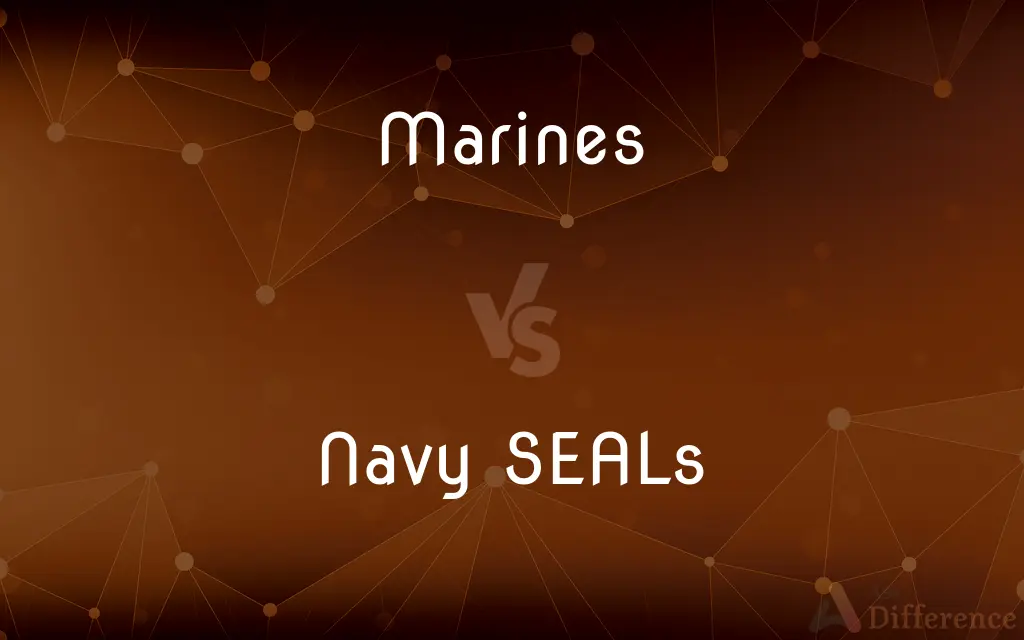Marines vs. Navy SEALs — What's the Difference?
By Tayyaba Rehman — Published on October 28, 2023
Marines are a branch of the U.S. military specializing in amphibious operations, while Navy SEALs are an elite special operations force within the U.S. Navy. Both serve unique roles.

Difference Between Marines and Navy SEALs
Table of Contents
ADVERTISEMENT
Key Differences
The Marines are a distinct branch of the U.S. military, primarily responsible for providing power projection from the sea. They often handle amphibious assaults and work alongside the Navy. In contrast, Navy SEALs operate as a part of the U.S. Navy and are a specialized elite force trained for unconventional warfare, counter-terrorism, and direct action missions.
While Marines undergo rigorous training to become adept at all elements of warfare, their training is different from that of the Navy SEALs. The Navy SEALs undergo some of the most grueling military training in the world, known as BUD/S, to handle high-risk and complex missions.
The Marines, as a larger force, are equipped to conduct a range of military operations, from conventional warfare to humanitarian assistance. The Navy SEALs, on the other hand, often operate in smaller teams and are tasked with specialized missions, sometimes covert in nature.
Both Marines and Navy SEALs can be deployed worldwide and are versatile in their operations. However, while the Marines often deploy as larger units or battalions, Navy SEALs operate in smaller teams, focusing on precision strikes and specialized objectives.
It's essential to recognize that both the Marines and Navy SEALs play crucial roles in the U.S. defense strategy. Their training, missions, and operational capacities complement one another, ensuring comprehensive military coverage.
ADVERTISEMENT
Comparison Chart
Primary Function
Amphibious operations and power projection from the sea.
Elite special operations, unconventional warfare, and counter-terrorism.
Part of
Separate branch of U.S. military.
U.S. Navy.
Training Intensity
Rigorous military training.
Extremely grueling specialized training, including BUD/S.
Deployment Size
Often deploy as battalions or larger units.
Operate in smaller teams.
Mission Type
Range from conventional warfare to humanitarian assistance.
Specialized, often covert, high-risk missions.
Compare with Definitions
Marines
Specialists in both land and sea-based warfare.
The versatility of the Marines makes them a formidable force.
Navy SEALs
Known for precision strikes and covert operations.
The Navy SEALs' mission was classified due to its sensitive nature.
Marines
Ground forces that work closely with the Navy.
The Marines and the Navy often collaborate on joint operations.
Navy SEALs
Trained for unconventional warfare and high-risk missions.
Navy SEALs are often chosen for tasks too challenging for regular forces.
Marines
Known for their esprit de corps and distinct culture.
The Marines' motto, Semper Fidelis, signifies their loyalty and commitment.
Navy SEALs
An elite special operations force within the U.S. Navy.
The Navy SEALs conducted a covert operation to rescue hostages.
Marines
Of or relating to the sea
Marine exploration.
Navy SEALs
Undergo some of the most intense military training, BUD/S.
Many aspire to become Navy SEALs, but few complete the demanding BUD/S training.
Marines
Native to, inhabiting, or formed by the sea
Marine animals.
Navy SEALs
Often operate in smaller, specialized teams.
A team of Navy SEALs was tasked with reconnaissance behind enemy lines.
Marines
Relating to a system of oceanic habitats coextensive with the continental shelf, ranging from deep water to unprotected coastlines and characterized along its landward edge by exposure to wave action and tidal currents and by the absence of trees, shrubs, or emergent vegetation.
Marines
Of or relating to shipping or maritime affairs.
Marines
Of or relating to sea navigation; nautical
A marine chart.
Marines
Of or relating to troops that serve at sea as well as on land, specifically the US Marine Corps.
Marines
A soldier serving on a ship or at a naval installation.
Marines
Often Marine A member of the US Marine Corps.
Marines
The mercantile or naval ships or shipping fleet of a country.
Marines
The governmental department in charge of naval affairs in some nations.
Marines
A painting or photograph of the sea.
Marines
Plural of marine
Marines
Alternative form of marine corps
Marines
A branch of the U.S. military focusing on amphibious operations.
The Marines stormed the beach to secure a foothold.
Marines
Engage in a broad range of military operations.
The Marines were deployed for both combat and humanitarian missions.
Common Curiosities
Are the Marines and Navy SEALs part of the same military branch?
No, the Marines are a separate branch, while Navy SEALs are within the U.S. Navy.
Which force is larger, Marines or Navy SEALs?
The Marines are a larger force, while Navy SEALs are a specialized elite group.
Are Navy SEALs missions always covert?
Not always, but they are often tasked with covert or specialized missions.
Can both Marines and Navy SEALs operate on land and sea?
Yes, though their specific roles and missions may vary.
Which is more specialized in counter-terrorism operations?
Navy SEALs are more specialized in counter-terrorism and unconventional warfare.
Who handles amphibious assaults in the U.S. military?
The Marines are primarily responsible for amphibious operations.
Do Navy SEALs and Marines undergo the same training?
No, while both have rigorous training, Navy SEALs undergo specific and extremely grueling training like BUD/S.
Do Marines and Navy SEALs ever collaborate on missions?
Yes, they can work together, depending on the mission's nature and requirements.
How long is the training for Navy SEALs?
BUD/S, the primary training for Navy SEALs, lasts for about six months, but additional training follows.
What is the Marines' motto?
The Marines' motto is "Semper Fidelis," meaning "Always Faithful."
Share Your Discovery

Previous Comparison
MDF vs. Plywood
Next Comparison
President vs. Prime MinisterAuthor Spotlight
Written by
Tayyaba RehmanTayyaba Rehman is a distinguished writer, currently serving as a primary contributor to askdifference.com. As a researcher in semantics and etymology, Tayyaba's passion for the complexity of languages and their distinctions has found a perfect home on the platform. Tayyaba delves into the intricacies of language, distinguishing between commonly confused words and phrases, thereby providing clarity for readers worldwide.













































